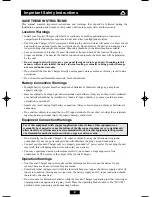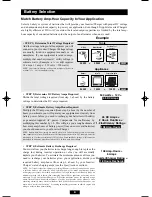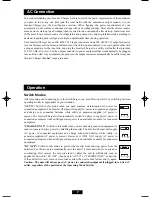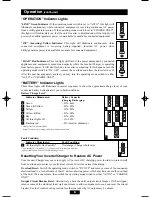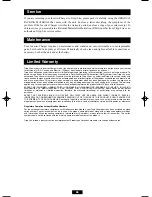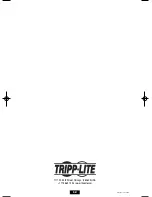
6
Battery Connection
• Connect DC Wiring:
Though your Inverter/Charger is a high-efficiency
converter of electricity, its rated output capacity is limited by the length and gauge
of the cabling running from the battery to the unit. Use the shortest length and
largest diameter cabling (maximum 2 AWG (6.544 mm)) to fit your
Inverter/Charger’s DC connectors. Shorter and heavier gauge cabling reduces
DC voltage drop and allows for maximum transfer of current. Your
Inverter/Charger is capable of delivering peak wattage above its rated
continuous wattage output for brief periods of time. See the
Specifications
section for details. Heavier gauge cabling should be used when continuously operating heavy draw
equipment under these conditions. Tighten your Inverter/Charger and battery terminals to approximately
3.5 Newton-meters of torque to create an efficient connection and to prevent excessive heating at this
connection. Insufficient tightening of the terminals could void your warranty.
See the
Specifications
section for battery wiring recommendations.
• Connect Ground:
Use an 8 AWG (3.264 mm) wire or larger to connect the Main Ground Lug to earth
ground. See the
Features
section to locate the Main Ground Lug on your Inverter/Charger. All
installations must comply with national and local codes and ordinances.
• Connect Fuse:
NEC (National Electrical Code) article 551 requires that you connect all of your
Inverter/Charger’s positive DC connectors directly to a UL-listed fuse(s) and fuse block(s) within 18
inches (45.72 cm) of the battery. The minimum rating of the DC fuse is listed in the
Specifications
section. See the following battery configuration diagrams for proper fuse placement.
Connect your Inverter/Charger to your batteries using the following procedures
DC Connectors
Battery Configuration
You may connect one or more batteries to your Inverter/Charger in either of the following
configurations.
Parallel Connection: The voltage of each connected battery must match the Inverter/Charger's
Nominal DC Input Voltage (12 V).
Series Connection: The total voltage of all connected batteries must match the Inverter/Charger's
Nominal DC Input Voltage (12 V). Example: 6 V + 6 V = 12 V.
Contact Tripp Lite technical support for assistance with battery connection configurations.
2
1
12 Volts
12 Volts
APSX700HF
Parallel Connection
WARNING!
• Failure to properly ground your Inverter/Charger may result in a lethal
electrical shock hazard.
• Never attempt to operate your Inverter/Charger by connecting it directly
to output from an alternator rather than a battery or battery bank.
• Observe proper polarity with all DC connections.
Battery
UL-Listed Fuse & Fuse Block mounted within 18 inches (45.72 cm) of battery
Large-Diameter Cabling, Maximum 2 AWG (6.544 mm), to Fit Terminals
1
6 Volts
6 Volts
APSX700HF
2
Series Connection
A
B
C
A
A
B
B
C
C
200705102 93-2678 APSX700HF OM.qxd 8/30/2007 12:34 PM Page 6


